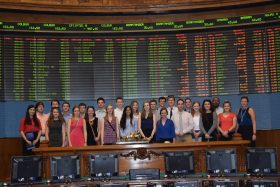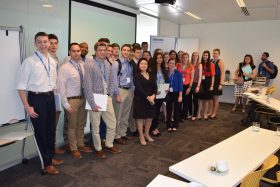First-year Business Fellows spent two weeks in Latin America examining the differences in economic institutions between Chile and Argentina.
 Twenty-three first-year Business Fellows traveled to Chile and Argentina in January as part of the Winter Term course “Business, Culture and Microfinance in Latin America.”
Twenty-three first-year Business Fellows traveled to Chile and Argentina in January as part of the Winter Term course “Business, Culture and Microfinance in Latin America.”
The course guided students to explore the rich cultural, economic and historical similarities and differences between Chile and Argentina.
While abroad, the fellows participated in business visits, where they had the opportunity to meet with executives at the following companies: Deloitte, LATAM Airlines, Accion Emprendedora, Entel Chile, Banco Patagonia, Refres Now, BMC and Datafactory.
 “This was a fantastic opportunity to see the material we’ve been studying in our cohort classes put into practice in the business world,” said Business Fellow Chris Folsom. “Visiting a variety of business firms in two of Latin America’s fastest developing countries was an exceptional experience and highlighted the importance of becoming a globally aware citizen in today’s increasingly globalized world.”
“This was a fantastic opportunity to see the material we’ve been studying in our cohort classes put into practice in the business world,” said Business Fellow Chris Folsom. “Visiting a variety of business firms in two of Latin America’s fastest developing countries was an exceptional experience and highlighted the importance of becoming a globally aware citizen in today’s increasingly globalized world.”
The fellows also visited economic, cultural and political sites, including the Museum of Memory and Human Rights, La Moneda Palace, Los Dominicos Market, Teatro Colon, San Telmo Antique Fair Market and the Graffitimundo street arts tour. They also participated in a tour of local cafes.
As part of the course, the fellows partnered with the microfinance and community banking organization Nuestras Huellas in order to further their understanding of capital flow, collateral, entrepreneurship and economics in Chile and Argentina. Nuestras Huellas is committed to improving the living conditions of the poorest sectors of Greater Buenos Aires, and supports more than 1,000 entrepreneurs through the proliferation of their community banking model.
Prior to traveling to Latin America, the fellows developed and implemented financial support mechanisms to raise funds for a Nuestras Huellas community bank. They raised nearly $1,000 over the span of a week.
The course and travel component were led by Mark Kurt, associate professor of economics, and Danny Lanier, assistant professor of accounting.


